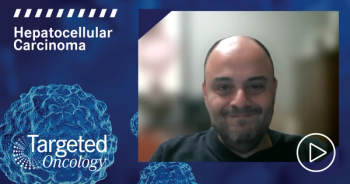
The Expansion of Treatment in the Firstline Setting of HCC
Richard Kim, MD, walks through options in the frontline setting for patients with advanced staged hepatocellular carcinoma and how newer treatments have impacted this patient population.
Richard Kim, MD, service chief of Medical Gastrointestinal Oncology at the Moffitt Cancer Center in Orlando, Florida, discusses the current treatment landscape for patients with hepatocellular carcinoma (HCC) and how the frontline setting has changed for patients with advanced HCC to incorporate immunotherapy (IO) treatment.
One of the major studies to look at the use of IO in this patient population was the randomized, open-label, multicenter, global, phase 3 HIMALAYA study (NCT03298451) looking at the efficacy safety of durvalumab (Imfinizi) plus tremelimumab (Imjudo) vs the tyrosine kinase inhibitor (TKI) sorafenib (Nexavar). Results from this IO-IO combination were also positive in patients with urothelial and non–small cell lung cancer, and results from the HIMALYA study continued to show that benefit in the HCC population.
Patients with stage III or IV unresectable HCC receiving the combination of anti–PD-L1 immunotherapy and anti–CTLA-4 immunotherapy had reduced risk of death by 22% versus patients with advanced HCC given sorafenib alone. Moreover, the 3-year overall survival (OS) rate was 30.7% with durvalumab plus tremelimumab compared with 24.7% with durvalumab alone and 20.2% with sorafenib alone. The overall response rate in the combination therapy arm was also higher compared with patients on either durvalumab or sorafenib alone at 20.1%, 17%, and 5.1%, respectively.
Another phase 3 trial Kim mentions is the IMbrave 150 study (NCT03434379) looking at the combination of atezolizumab (Tecentriq) and bevacizumab (Avastin).
TRANSCRIPTION:
0:08 | In [the] first line for advanced patients, I think we've come a long way. I think that we have more options than in the past. As you know, for the past 10 years there was only 1 drug approved in this setting that was a TKI called sorafenib. But now there are 2 large, randomized phase 3 studies showing that IO, immunotherapy, is better than a TKI. These are 2 [different] trials, one is the IMbrave 150 study, which compared atezolizumab and bevacizumab vs sorafenib [and the] other one is the HIMALAYA study that compared durvalumab and tremelimumab, which is a combination of IO-IO, showing superiority to sorafenib.
0:46 | Based on those 2 phase 3 studies, I think anybody who's diagnosed with advanced HCC should get IO based therapy, unless if there's a contraindication to IO. If there's a contraindication to IO, then yes, there's a backup of using TKIs including sorafenib and lenvatinib.























